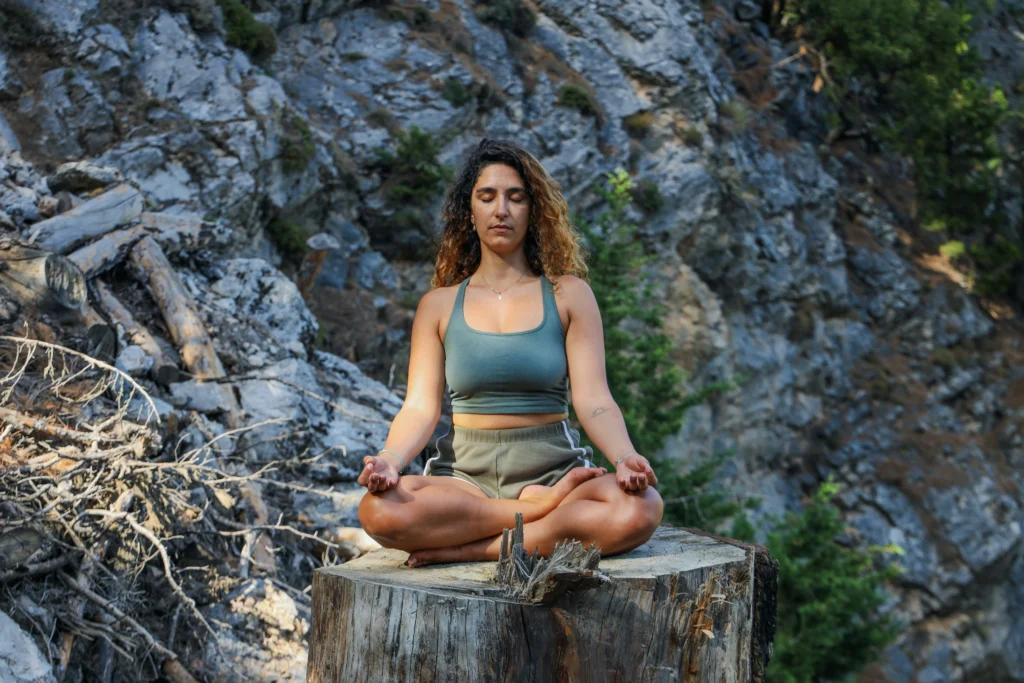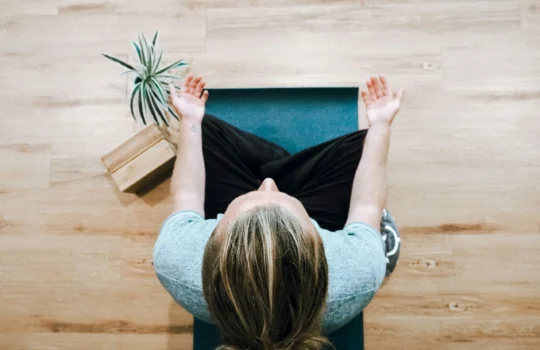Ever found yourself in the middle of a chaotic day, craving a moment of peace in the storm? In our always-on world, finding a sanctuary of calm can seem like a quest for a mythical treasure. Enter meditation – not just a buzzword for the spiritually enlightened but a practical tool for anyone seeking solace in the silence. Here, you’ll find 10 reasons of why you should learn meditate and benefits of meditation.
It’s no wonder that meditation has soared in popularity, transcending cultural and geographical boundaries to become a global phenomenon. Why, you ask? Because it works. Meditation isn’t just about sitting quietly; it’s about unlocking a world of benefits that touch every aspect of your life. From stress reduction to enhanced creativity, the perks of meditation are as vast as they are compelling.
So, if you’ve ever been curious about how sitting still and breathing deeply can transform your life, you’re in the right place. Let’s embark on a journey into the heart of meditation and discover why learning this ancient practice could be the best decision you ever make.
Table of Contents
The Magic of Mindfulness: What is Meditation?
Meditation is often shrouded in mystery, conjuring images of monks in distant monasteries or serene figures in lotus positions. But at its core, meditation is a simple and accessible practice with roots that stretch back thousands of years, across many cultures and philosophies. It’s about training your mind to focus and redirect your thoughts, to cultivate a state of awareness and calm that transcends your daily hustle.
A Brief Dive into History
Meditation’s origins can be traced back to ancient civilizations, including Hindu traditions of Vedantism around 1500 BCE and Buddhist practices that followed centuries later. Despite its ancient roots, meditation remains timeless, evolving to meet the needs of today’s seekers of peace.
Types of Meditation
Meditation comes in many flavors, each with its unique focus and techniques. Some popular forms include:
- Mindfulness Meditation: Rooted in Buddhist teachings, it emphasizes present-moment awareness without judgment.
- Transcendental Meditation: Involves chanting a mantra to quiet the mind and reach a state of pure consciousness.
- Guided Meditation: Uses visualization or guided imagery to evoke calm scenes or experiences, often led by an instructor or audio recording.
- Loving-Kindness Meditation (Metta): Focuses on developing feelings of goodwill, kindness, and warmth towards others.
How Does It Work?
At its heart, meditation works by bringing you back to the now, to this very moment, free from the distractions and stressors of life. By focusing your attention on a single point of reference (like your breath, a mantra, or a visual object), you can quiet the mind’s chatter, reduce stress, and promote relaxation. This mental discipline enhances your ability to regulate emotions, observe your thoughts without attachment, and develop a deeper sense of inner peace.
1. Zen Your Way to Stress Relief
In the whirlwind of deadlines, meetings, and endless to-dos, stress has become a constant companion for many of us. But what if there was a way to hit the pause button, to find a moment of tranquility amidst the chaos? Meditation is that secret oasis of calm, offering a proven pathway to stress relief.
The Science of Calm
When you meditate, you enter a state of deep relaxation, which significantly reduces stress levels. This isn’t just subjective experience speaking; it’s backed by science. Research shows that meditation decreases the production of stress hormones like cortisol and reduces inflammation in the body. Imagine having a natural, side-effect-free tool at your disposal, ready to dissolve stress with every breath you take.
Practical Steps to Peace
Starting your journey to stress relief can be as simple as finding a quiet spot, closing your eyes, and focusing on your breath. Even just a few minutes a day can pave the way to a more serene mind. Over time, this practice builds a resilience to stress, helping you to face challenges with a steadier hand and a calmer heart.
2. Boost Your Brain Power with Meditation
If you’re looking to sharpen your mind, meditation might just be the brain gym you’ve been searching for. Far from being a purely spiritual or relaxation practice, meditation has concrete benefits for your cognitive faculties, enhancing everything from memory to creativity.
A Smarter Way to Brain Health
Meditation is like a multivitamin for your brain, nourishing it in ways you might not have imagined. Studies have found that regular meditation not only improves focus and attention but also enhances memory retention and the ability to process information. It’s as if each session of meditation fine-tunes your brain’s circuitry, making it more efficient and powerful.
Creativity Unleashed
But it’s not just about boosting the brain’s processing power; meditation also unlocks the gates to creativity. By fostering a state of relaxation and open-mindedness, meditation allows for the free flow of ideas, making it easier to solve complex problems and think outside the box. Whether you’re an artist seeking inspiration or a professional looking for innovative solutions, meditation can open the door to a world of creative possibilities.
3. Sleep Like a Baby: Meditation’s Role in Sleep Improvement
Tossing and turning through the night, counting sheep, or scrolling through your phone in the wee hours—sound familiar? In our fast-paced world, a good night’s sleep has become a rare luxury for many. But here’s a secret: meditation might just be the key to unlocking restful slumber.
The Sleep-Meditation Connection
Meditation has a remarkable ability to combat insomnia and improve sleep quality. By calming the mind and body, meditation prepares you for sleep, making it easier to drift off into dreamland. Studies have shown that meditation increases melatonin levels (the sleep hormone) and enhances REM sleep, meaning you’re not just sleeping more, but better.
Nighttime Rituals for Sweet Dreams
Incorporating meditation into your nighttime routine can transform your sleep quality. Try a guided meditation focused on relaxation or deep breathing exercises before bed. These practices help quiet the mind’s chatter, easing you into a state of deep relaxation perfect for a rejuvenating night’s sleep.
4. An Antidote to Anxiety
In the shadow of stress, anxiety often lurks, waiting to pounce with its worry-filled whispers. It’s a feeling too many of us know all too well. But there’s hope on the horizon, and it comes in the form of meditation—a powerful antidote to the anxiety that plagues our daily lives.
Meditation’s Calming Effect on Anxiety
Meditation teaches us to observe our thoughts without judgment, helping to break the cycle of worry and fear that fuels anxiety. By focusing on the present moment, meditation reduces the overthinking that often leads to anxious feelings. Scientific research supports this, showing significant reductions in anxiety symptoms among those who practice meditation regularly.
Simple Steps to Alleviate Anxiety
Beginning a meditation practice can seem daunting, especially when your mind is buzzing with anxious thoughts. However, starting small can lead to significant changes. Mindfulness meditation, in particular, is effective in managing anxiety. Dedicate a few minutes each day to observe your breath or the sensations in your body. This practice can anchor you in the present, providing a refuge from the storm of anxiety.
5. Elevate Your Mood, Embrace Meditation
Ever feel like you’re riding an emotional rollercoaster, with highs that sky-rocket and lows that plummet? You’re not alone. Maintaining a stable, positive mood in today’s world can be a challenge. But what if we told you there’s a way to find more consistent joy and contentment? Yes, it’s meditation—your natural mood booster.

The Happiness Effect
Meditation isn’t just about finding peace and quiet; it’s about unlocking the doors to a happier life. Regular meditation practice has been linked to increased levels of serotonin, often dubbed the “happiness hormone.” This means that by simply sitting and breathing, you can enhance your mood, reduce feelings of depression, and foster a greater sense of well-being.
Meditation Practices for a Brighter Outlook
To start your journey towards a sunnier disposition, try incorporating gratitude meditation into your routine. Spend a few moments each day focusing on things you’re grateful for, big or small. This practice can shift your perspective, helping you see the world in a more positive light and significantly boosting your mood.
6. Meditation: A Gateway to Enhanced Physical Health
The benefits of meditation transcend the confines of the mind, extending their healing touch to the body. Surprisingly, this ancient practice can have profound effects on your physical health, acting as a gateway to a healthier, more vibrant you.
A Panacea for the Body
Meditation’s health benefits are wide-ranging, from lowering high blood pressure and reducing the risk of heart disease to alleviating chronic pain. It achieves this by lowering stress levels, which in turn reduces inflammation and improves the body’s overall function. Furthermore, meditation has been shown to boost the immune system, making you better equipped to fend off illnesses.
Integrating Meditation for Physical Wellness
Embracing meditation for physical health doesn’t require hours of sitting in silence. Start with simple mindfulness or guided meditations focusing on bodily sensations. Even gentle yoga or Tai Chi can serve as meditative practices that not only calm the mind but also benefit the body. By making meditation a regular part of your life, you’ll not only feel better mentally but start to notice tangible improvements in your physical health as well.

7. Strengthen Your Self-Awareness
In the hustle and bustle of daily life, it’s easy to lose touch with our inner selves. We get so caught up in the external demands that we forget to listen to what we truly need or feel. That’s where meditation comes in as a powerful tool for enhancing self-awareness, allowing us to reconnect with our inner voice and intuition.
The Journey Inward
Meditation offers a unique opportunity to pause and observe our thoughts, emotions, and bodily sensations without judgment. This practice of mindful awareness cultivates a deeper understanding of ourselves, helping us recognize our patterns, triggers, and habits. Increased self-awareness leads to more mindful living, improving our decisions and reactions in daily life.
Practices to Cultivate Self-Awareness
To begin enhancing your self-awareness, engage in mindfulness meditation. Focus on your breath, and when your mind wanders, gently bring your attention back. This simple act of returning to the breath serves as a training ground for noticing when you’re distracted and choosing to come back to the present moment. Over time, this heightened awareness can extend beyond meditation sessions, enriching every aspect of your life.
8. Boost Your Immunity, One Breath at a Time
In a world where health is more important than ever, finding natural ways to boost our immune system is a golden ticket. Surprisingly, meditation can be just that—a non-invasive, simple practice that strengthens your body’s defense mechanisms from the inside out.
Meditation and Immune Health
Engaging in regular meditation has been shown to have a positive effect on the immune system. It reduces stress and inflammation in the body, which are known to compromise immune function. Furthermore, meditation promotes a healthier lifestyle, often leading to better sleep patterns, reduced anxiety, and improved overall well-being, all of which contribute to a stronger immune system.
Breathing for Better Immunity
One of the simplest ways to tap into meditation’s immune-boosting benefits is through focused breathing exercises. Practices like deep abdominal breathing, pranayama, or even guided meditations aimed at relaxation can enhance immune function by activating the body’s relaxation response. By dedicating just a few minutes a day to these practices, you can support your body’s natural defenses and foster a healthier you.
9. Meditation and Aging: Turning Back Time
It might seem like the fountain of youth is a myth, but meditation comes surprisingly close as a natural anti-aging remedy. Not only can it help keep your mind sharp, but it also has profound effects on your physical health, potentially slowing the aging process.
The Science of Meditation and Longevity
Research suggests that regular meditation practice can impact telomere length—an essential part of human cells that affects how our cells age. Telomeres shorten as we age, but meditation has been shown to preserve telomere length, effectively slowing the aging process at the cellular level. Furthermore, the stress-reducing benefits of meditation can reduce inflammation and improve heart health, contributing to a longer, healthier life.
Age Gracefully with Meditation
Incorporating meditation into your routine can be a simple yet powerful way to combat the effects of aging. Whether it’s through mindfulness practices, deep-breathing exercises, or guided visualizations, finding a few minutes each day to meditate can make a significant difference in your overall well-being as you age.
10. Cultivating Emotional Resilience Through Meditation
One of the most transformative benefits of meditation is its ability to cultivate emotional resilience, equipping individuals with the strength to navigate life’s ups and downs with grace and poise. In a world where stress, uncertainty, and change are ever-present, having a robust emotional foundation is invaluable.
How Meditation Builds Emotional Resilience
Meditation practices, particularly mindfulness meditation, teach us to observe our thoughts and feelings without getting caught up in them. This detachment allows us to experience emotions fully without being overwhelmed by them, enabling a clearer, more balanced response to life’s challenges. Regular meditation deepens this capacity, making us more resilient over time.
Meditation as a Tool for Emotional Healing
Beyond building resilience, meditation can be a powerful tool for emotional healing. By creating a safe, quiet space for introspection, meditation allows us to process and release pent-up emotions, leading to healing and growth. This emotional release not only enhances our resilience but also contributes to a more joyful, fulfilling life.
Building a Meditation Habit: Tips and Tricks
Starting a new habit can be daunting, but with the right approach, incorporating meditation into your daily life can become as natural as brushing your teeth. Here are some tips and tricks to help you build a lasting meditation practice.
a. Start Small and Be Consistent
Begin with just a few minutes of meditation each day. Consistency is key, so aim to meditate at the same time each day to establish a routine.
b. Find Your Space
Create a designated meditation space that is quiet, comfortable, and free from distractions. This will help you associate this space with meditation and make it easier to enter a meditative state.
c. Use Tools and Resources
There’s a wealth of meditation apps, online courses, and books available. Experiment with different resources to find what resonates with you and keeps you motivated.
d. Be Patient and Kind to Yourself
Remember, meditation is a practice. Some days will be easier than others. Approach your meditation journey with patience and self-compassion, acknowledging that progress takes time.
Conclusion to Benefits of Meditation
Meditation is more than just a practice; it’s a journey towards a more mindful, healthy, and fulfilling life. From enhancing your mood and cognitive abilities to improving sleep, reducing anxiety, and even slowing the aging process, the benefits of meditation touch every aspect of our being. As we’ve explored, starting a meditation practice can be simple, and the rewards are immense. So why not take that first step today? Your mind, body, and soul will thank you.
Share Your Thoughts!
Now, we’d love to hear from you! Have you tried meditation, or are you considering starting? What benefits are you most excited about? Do you have any tips for beginners looking to make meditation a part of their daily routine? Share your thoughts, experiences, and questions in the comments below. Let’s embark on this journey of mindfulness together!







